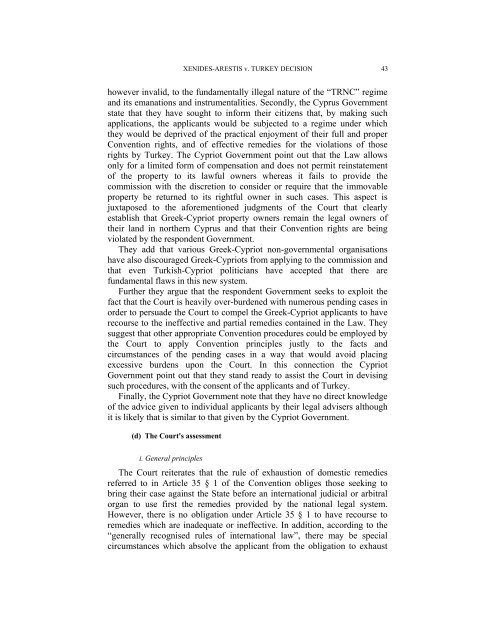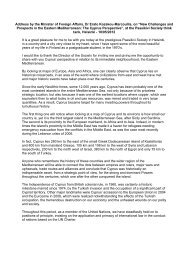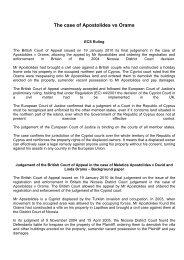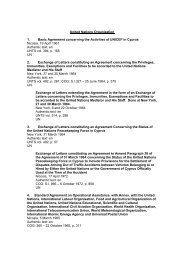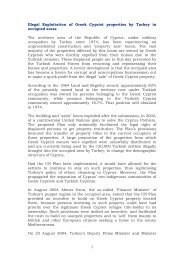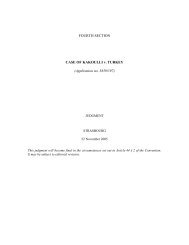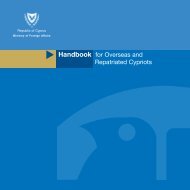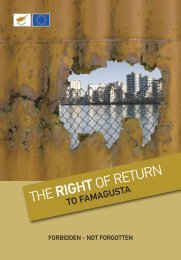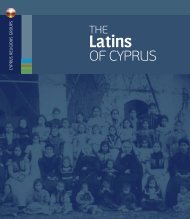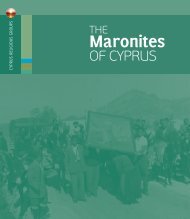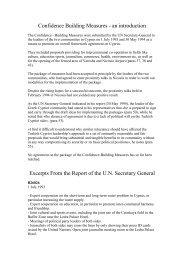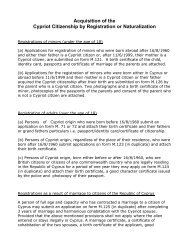Myra Xenides- Arestis v. Turkey
Myra Xenides- Arestis v. Turkey
Myra Xenides- Arestis v. Turkey
Create successful ePaper yourself
Turn your PDF publications into a flip-book with our unique Google optimized e-Paper software.
XENIDES-ARESTIS v. TURKEY DECISION 43however invalid, to the fundamentally illegal nature of the “TRNC” regimeand its emanations and instrumentalities. Secondly, the Cyprus Governmentstate that they have sought to inform their citizens that, by making suchapplications, the applicants would be subjected to a regime under whichthey would be deprived of the practical enjoyment of their full and properConvention rights, and of effective remedies for the violations of thoserights by <strong>Turkey</strong>. The Cypriot Government point out that the Law allowsonly for a limited form of compensation and does not permit reinstatementof the property to its lawful owners whereas it fails to provide thecommission with the discretion to consider or require that the immovableproperty be returned to its rightful owner in such cases. This aspect isjuxtaposed to the aforementioned judgments of the Court that clearlyestablish that Greek-Cypriot property owners remain the legal owners oftheir land in northern Cyprus and that their Convention rights are beingviolated by the respondent Government.They add that various Greek-Cypriot non-governmental organisationshave also discouraged Greek-Cypriots from applying to the commission andthat even Turkish-Cypriot politicians have accepted that there arefundamental flaws in this new system.Further they argue that the respondent Government seeks to exploit thefact that the Court is heavily over-burdened with numerous pending cases inorder to persuade the Court to compel the Greek-Cypriot applicants to haverecourse to the ineffective and partial remedies contained in the Law. Theysuggest that other appropriate Convention procedures could be employed bythe Court to apply Convention principles justly to the facts andcircumstances of the pending cases in a way that would avoid placingexcessive burdens upon the Court. In this connection the CypriotGovernment point out that they stand ready to assist the Court in devisingsuch procedures, with the consent of the applicants and of <strong>Turkey</strong>.Finally, the Cypriot Government note that they have no direct knowledgeof the advice given to individual applicants by their legal advisers althoughit is likely that is similar to that given by the Cypriot Government.(d) The Court's assessmenti. General principlesThe Court reiterates that the rule of exhaustion of domestic remediesreferred to in Article 35 § 1 of the Convention obliges those seeking tobring their case against the State before an international judicial or arbitralorgan to use first the remedies provided by the national legal system.However, there is no obligation under Article 35 § 1 to have recourse toremedies which are inadequate or ineffective. In addition, according to the“generally recognised rules of international law”, there may be specialcircumstances which absolve the applicant from the obligation to exhaust


